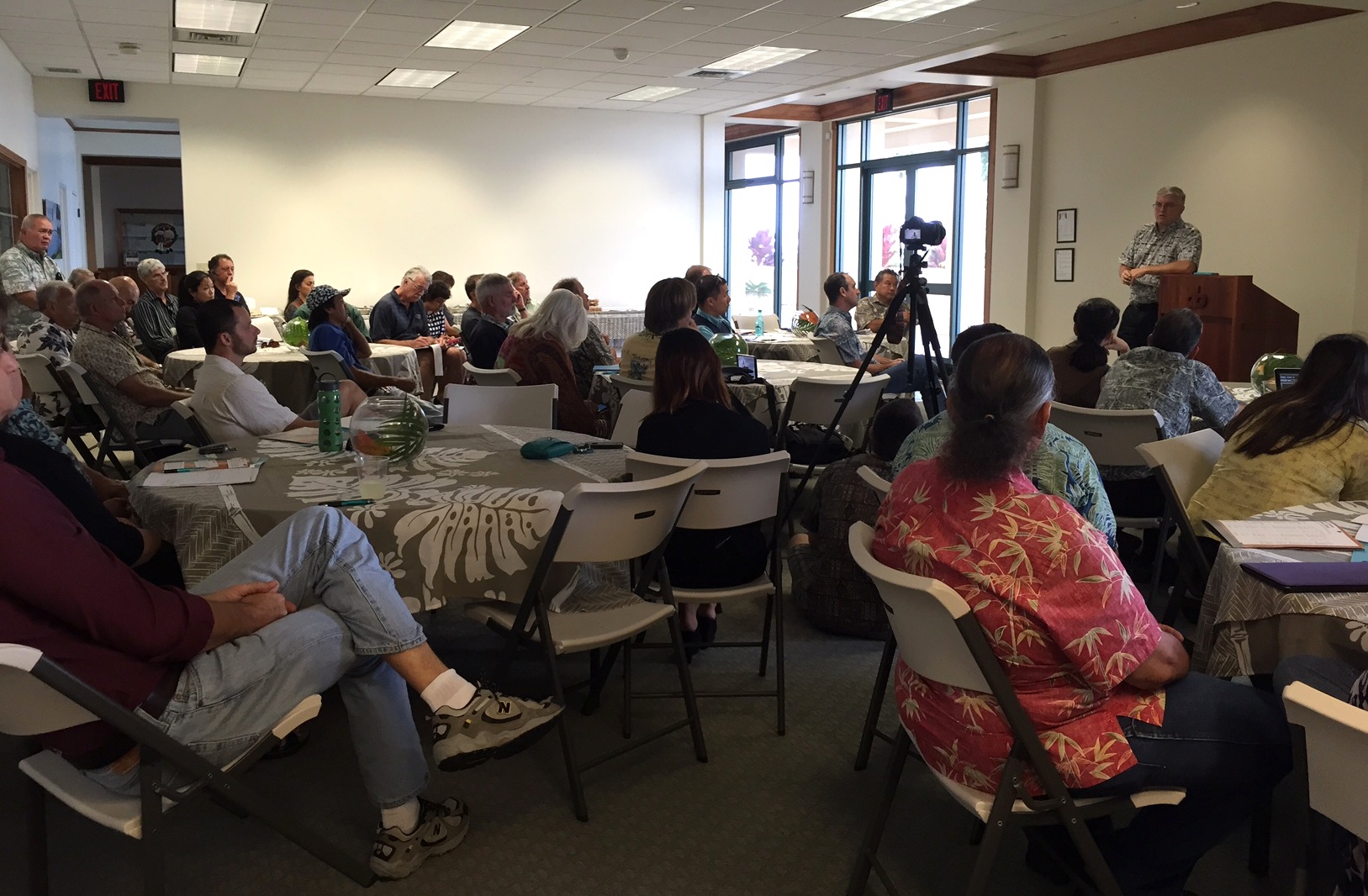Richard Ha writes:
We had an interesting presentation Friday from two executives from Kaua‘i’s electrical utility, the Kaua‘i Island Utility Cooperative (KIUC). David Bissell is CEO, and Dennis Esaki was a founding member who only recently left the KIUC board.
It was amazing to hear what KIUC went through to purchase Kaua‘i Electric Company and form the utility cooperative. The Kaua‘i County Council and mayor were originally against the purchase, and the PUC turned down its first purchase bid as not being in the best interest of the users. But the founding group continued to rework its plan and was ultimately successful the second time it presented a bid.
In total, it was about a two-year process and the group purchased Kaua‘i Electric Company in 2002 for $215 million. And, Esaki said, referring to the county administrators, “they’re all on board now.”
This month, Kaua‘i’s electricity rates are lower than any of the islands but O‘ahu’s (mostly because of the oil price decline). Most months, its rates are a little lower than the Big Island's and a little higher than Maui.
Since 2003, ratepayers have received $30 million in refunds and patronage capital — the amount of money left after all the bills are paid, and the co-op has met its lenders’ requirements. This is money that circulates back into the community.
Members have $80 million in equity, which is what they own of the co-op. When the utility was purchased 12 years ago, it was 100 percent debt-financed, so the equity at that time was zero.
KIUC has gone from about five percent renewable energy in 2009 to 18 percent today. It will be at about 40 percent by the end of next year.
From the KIUC 2013 Annual Report (click to enlarge):
The organization of the co-op also reflects what the people of Kaua‘i want, because its board is selected by the people. Esaki and Bissel said that at first there was almost total, and repeated, board turnover as ratepayers regularly voted out board members who weren’t doing what they wanted. Eventually, they said, the board has stabilized.
Projects are financed through national co-op financing, which results in much lower financing costs.
You can watch a video of the meeting below. Thanks to Chester Lowrey for videotaping!
There was a lot of community interest in the KIUC presentation, with a good turnout from various community groups. The presentation was sponsored by three organizations:
The Big Island Community Coalition, the steering committee of which is made up of David DeLuz, Jr., Rockne Freitas, Michelle Galimba, myself, Wallace Ishibashi, Kuulei Kealoha Cooper, Ka‘iu Kimura, D. Noelani Kalipi, Robert Lindsey, H. M. Monty Richards, Marcia Sakai, Ku‘u Lehua Veincent, and William Walter.
The board of the Hilo-Hamakua Community Development Corporation, which is President Donna Johnson, Judi Steinman, Glenn Carvalho, Eric Weinert, Jason Moniz, Gerald DeMello, Colleen Aina, and Richard Ha.
And Hawai‘i Farmers and Ranchers United, which represents more than 90 percent of the farming goods produced on the Big Island.
Ed Olson donated the use of his Wainaku Executive Center for the meeting.
We have formed a steering committee to discuss this further. The committee consists of Gerald DeMello, Michelle Galimba, Wally Ishibashi, Donna Johnson, Eric Weinert, Vincent Paul Pontieux, Marco Mangelsdorf, Russell Ruderman, and myself. I’ll keep you posted on further developments.
Edited 12/21/14 at 10:45 pm; 1/5/15; 1/30/15.




I am concerned that this is perhaps not a good way to go although I think it is better than the current situation and better than nothing the latter being the stance of most of our National Leader. There is not only the local situation but a world-wide problem that is very very complex and will impinge on every local situation. I am worried that knee-jerk fear-induced half-measures may make the situation worse rather than better. I suspect there are a lot of solutions that are in the works in the scientific community that need to be taken into consideration and I know of some of the possibilities. I question the adequacy of the PUC separate island strategy because for one thing it may result in an insularity that will not be able to take advantage of new technology. It is not a reason not to try things but it should add a note of caution.